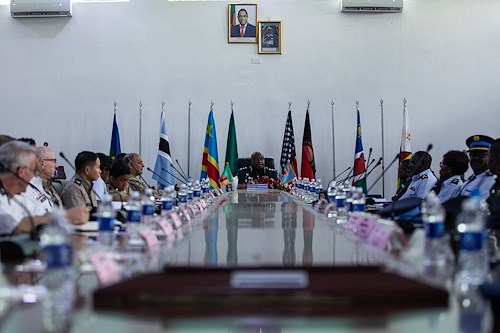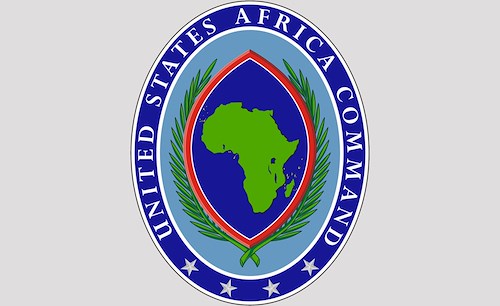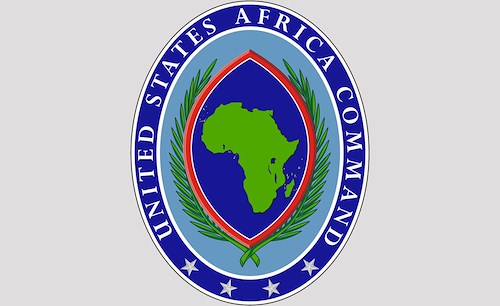During a military strategy forum October 4, 2011, General Carter F. Ham, commander of U.S. Africa Command, emphasized the importance of strengthening African military capabilities to address some of Africa's current security challenges while preventing future ones. (See related related transcript and CSIS video.)
Ham was invited by the Center for Strategic and International Studies (CSIS) to brief on topics including U.S. AFRICOM's strategic focus, the growing threat of violent extremism throughout Africa, U.S. involvement in the effort to counter the Lord's Resistance Army (LRA) extremist group, and budget concerns. CSIS is a foreign policy research institute in Washington, D.C.
Talking about his experiences as AFRICOM's commander for nearly six months, Ham expressed that he enjoyed the complexity and diversity of the command's mission and provided an overview of his two overarching principles: Firstly, finding African solutions to African problems, and secondly, that a safe, stable, and secure Africa is in the best interest of not only Africans but also the United States.
"The complexity, diversity, and severity of the security challenges that are spread across the continent can be a little staggering. It's easy to feel overwhelmed," Ham said. "What keeps me from feeling overwhelmed is in my travels and encounters with African leaders, both military and civilian...The challenge for us at AFRICOM is to find ways to help Africans address these concerns."
AFRICOM Priorities
Touching upon the command's strategy and priorities, Ham expressed that his greatest concern is the growing threat to the United States from extremist groups in Africa, particularly al Shabaab in Somalia, al Qaeda in the Sahel region, and Boko Haram in Nigeria.
"What keeps me awake at night is the thought of an American passport holding person who transits to a training camp in Somalia, gets some skill, then finds their way back to the United States to attack Americans here in our homeland," he said. "That's mission failure for us."
U.S. Africa Command's priorities focus largely on the regions that harbor these extremist groups. The highest priority region, Ham stated, is East Africa, where in addition to a number of violent extremist organizations, the region contends with piracy in the Horn of Africa, a devastating famine, as well as violence by the Lord's Resistance Army. The independence of South Sudan in July of this year also brings a new set of economic, political, and security challenges to the region.
In spite of its challenges, East Africa is also home to some of AFRICOM's key partner nations, Ham said, specifically noting Uganda and Burundi for their contributions African Union Mission in Somalia (AMISOM).
The command's other priority regions include the Sahel region, the home of Al Qaeda in the Islamic Maghreb (AQIM), and Nigeria, home to Boko Haram, the violent Islamist group responsible for the attack on the United Nations building in Abuja in August.
Warning attendees not to lose sight of the command's main purpose, Ham said, "We are first and foremost a Department of Defense geographic combatant command, and our primary responsibility is to protect America, Americans, and American interests from threats that might emanate from the continent of Africa."
Ham also talked briefly about U.S. Africa Command's non-traditional activities, led by the command's civilian-military deputy Ambassador J. Anthony Holmes.
"Non-traditional military activities of the command are just as important as the military side," he said "Because those contribute significantly to the underlying causes of instability across the continent, perhaps those in the long-term are more important."
Regional Approach Makes Budget Sense
Sharper prioritization is essential for U.S. Africa Command at a time of defense budget cuts and fiscal concerns, Ham said, adding that the command is looking to take a more regional approach to its activities by working with the African Union and other regional organizations to build capacity.
While Ham acknowledged the possibility that budget cuts may require the U.S. military to cut or reduce some of its programs in Africa, he stressed that Africa Command is a modest part of the DOD's overall budget. The investment into U.S. AFRICOM, he said, is outweighed by the benefits and long-term impact of the command's programs, and may even prevent future crises such as the recent one in Libya.
"I believe that a relatively small effort paid in prevention and deterrence building partner capacity will pay off for us in the long-run," Ham stated. "It won't prevent every emerging crisis. What we strive to do is by increasing the defense capabilities of our African partners and of the regional organizations, help them build the capacity not only to prevent hostilities but should prevention fail, to be able to more effectively respond to these emerging crises without us having to become involved."
Building Relationships with Nigeria, South Africa, and Angola
Ham discussed U.S. Africa Command's approach to engaging with three of Africa's most powerful nations: Nigeria, South Africa, and Angola.
AFRICOM's relationship with Nigeria is strong and growing, Ham said, noting the two countries have had a longstanding Navy and Air Force relationship. According to Ham, the command is working with Nigeria to help address some underlying causes contributing to the growth of the extremist group Boko Haram, as well as looking for ways to help Nigeria develop its counterterrorism capabilities.
Describing the U.S. military relations with Angola as "hands off," Ham said the biggest area of emphasis with Angola is its maritime domain, and Africa Command and Angola have started to develop a relationship based on its maritime needs.
Ham said that a military relationship is also growing with South Africa, largely due to the previous AFRICOM Commander General William E. Ward's efforts to demystify the command and engage with senior leaders there.
"This past summer, we had the largest exercise (Shared Accord) in the post-apartheid era. The military-to-military relationships are strong and growing," Ham said. "They should, rightfully, in my opinion, continue in a leadership role in Africa, and even more broadly, internationally. Leading African Union missions, UN Missions, their role in the South African Development Community, all of these are positive indicators."
Lord's Resistance Army
Ham talked briefly about U.S. involvement in countering the rebel militant group known as the Lord's Resistance Army, led by Joseph Kony, which continues to terrorize people in Uganda, the Democratic Republic of the Congo, Central African Republic, and South Sudan. The group has killed or abducted thousands and has driven millions from their homes.
The Lord's Resistance Army Disarmament and Northern Uganda Recovery Act, signed by President Barack Obama in May 2010, pledges the commitment of the United States to help bring an end to the brutality of the LRA. In November 2010, the U.S. government published its strategy for action against the LRA, which includes protecting civilians, apprehending the group's senior leaders, promoting defection from the LRA, and providing humanitarian assistance to affected communities.
"If you ever had any question if there' evil in the world, it's resident in the person of Joesph Kony and that organization," Ham said.
The U.S. military role, he said, focuses on facilitating intelligence, and in a U.S. Department of State-led effort, U.S. personnel trained a battalion of the Armed Forces of Democratic Republic of the Congo, to assist in this effort. According to Ham, the U.S. government is looking to increase support to the counter-LRA efforts by increasing the number of military advisors and trainers and training another battalion.
China
Ham concluded his briefing discussing the Chinese presence in Africa, which he said is not a military rival to the United States. While China can offer more affordable military equipment to nations, the United States offers sustainable training along with the equipment. Many countries, Ham said, utilize the equipment from China and training from the United States.
"I am not concerned about us falling strategically behind China in Africa," ham said. "There are areas where our interests are shared and we should further explore those."




